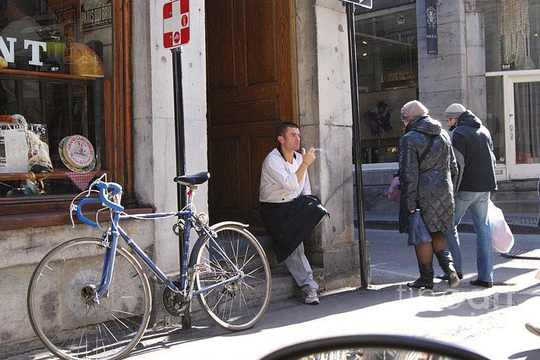London’s Food Scene: Flexibility, Diversity, Precarity
by
Eric Jeffers
September 21, 2023
Featured in Seeds of Struggle: Food in a Time of Crisis (#18)
A survey of shifts in the organisation and experience of restaurant work since Covid.

inquiry
London’s Food Scene: Flexibility, Diversity, Precarity
by
Eric Jeffers
/
Sept. 21, 2023
in
Seeds of Struggle: Food in a Time of Crisis
(#18)
A survey of shifts in the organisation and experience of restaurant work since Covid.
The last couple of decades have seen an exponential growth in the hospitality sector, particularly restaurants, kitchens, gastro pubs, bars, etc. The popular press would have us believe that this reflects changes in culture. People today are far more individualised, more busy, more experimental, more willing to take risks. People want to go out and try new things, they enjoy conspicuous consumption and hunger for experiences. It’s now fairly easy to find someone who will describe themselves as a ‘foodie’. Nonetheless, whilst people most certainly are more interested in eating out today than they were in the 1990s, it’s also important to remember that these cultural developments are also responsive to economic changes. People work more hours, they work later. What has been castigated as a culture of ‘convenience’, is really a working population who have seen their hours steady increasing, reducing their time to make food at home or share with friends outside of a business context. The other economic change is urban. Food-markets, street food vendors, pop-up venues and residency kitchens are integral to the process of gentrification. Look around at where these eateries are located. Overwhelmingly they are in historically working class areas, Hackney, Peckham, Brixton. What these spaces of consumption do is work to attract middle class people to the area, and local government, policy makers and the capitalist class are aware of this.
This context is important for understanding the fragmentation of kitchen work. Large kitchens with traditional divisions of labour (sous-chef, chef de partie, commis chef, kitchen porters, etc, etc) still exist, but I don’t think a lot of people understand how your smaller eateries in London work. Most of these vendors will be small businesses and partnerships. They will most likely have no employed staff and instead chefs will work on a self- employed basis. At first this move to self-employment seemed like a way chefs could acquire more freedom. They could call themselves “freelance”, their work could become flexible to their needs, they could come and go as they please, building up a reputation and become something of a travelling journeyman or personality. Indeed, this has been the narrative for a few people, but they are exceptional cases in what we can now see has been a wholesale industrial recombination that has injured worker’s long term interests.
Firstly, the pressure of finding work has become a lot more acute. Residency kitchens and food-markets are often short-term and seasonal. You can probably find work quite easily, but the fact is, you now have to be searching more often, making informal social connections through the industry, and be expected to travel all around the city chasing new jobs. Whilst in a lot of cases you can find semi-permanent work, you no longer have many of the working rights that fully employed contract workers could expect. No holiday pay, no pensions, no sick pay, no maternity. Our safety and security have been forfeited, almost entirely behind our backs. I have felt the ramifications of these changes particularly in the post-pandemic world. To date I have contracted covid five times, each time I have had to take at least 8 days off work, sometimes more. Whilst I can apply for statutory sick pay, this is about £85 a week, which isn’t even really what I would expect to earn in a day. Each bout of covid has effectively cost me about £600-700 in lost income. I dread the day I get a serious injury, as there will be no long-term sick pay.
In The Kitchen
Everyone already knows that kitchen work is arduous. But with the flexible small business model, a lot of the workplace stresses have increased in intensity. Hours in the kitchen are long, but when you’re running a staff of 2-3 people, all of the workload is on you. If somebody is sick, or doesn’t turn up for whatever reason, there’s no cover, nobody to step in. Your workload gets doubled. In kitchens this small, under time-pressured constraints and huge workloads, you don’t even have to worry about the stereotypical head chef screaming at you or cracking the proverbial whip, the dull pain felt in your constantly clenched jaw is a reminder of the ticking clock and fast approaching hyper-intense service periods. You could take a break if you wanted to, The Law even nominally protects your rights to do so. But if I were to take a break, I would just come back to an even bigger pile of work needed to be done in an even shorter time period.
There are two developments in particular that have made the service shift more difficult. Firstly, the kitchen porter has become a luxury. In fact, I don’t think I have ever worked anywhere with a member of staff whose only job is to clean. All cleaning is done by chefs. On the one hand, this has hurt the standing of the professional ego of the chef, who have often considered themselves above such practices. I’ve heard people say things like, “I remember the good old days when somebody would do this for you”. That being said, what the disappearance of this role registers is an industry-wide move to intensify labour and reduce overall labour costs. Who is going to pay for the kitchen porter? Secondly, the unintended results of steady rise of Ubereats, Deliveroo, Just Eat, etc. I have worked at the cusp of the introduction of these technologies. At first, only a few places did it, restaurants and kitchens would get by without it. However, it was soon realised that these apps were giving other businesses a competitive advantage. What had began as a relatively small side addition has rapidly morphed into an industry standard. Whilst working your busy service you can now expect the constant ding of a tablet and caustic buzz of a ticket machine, squawking at you whilst the chain of tickets get longer and longer as the take-away orders roll in at the same time as your seated customers. At peak times, a kitchen will now usually be much busier than the restaurant’s seating capacity. Although lots of people are now working precariously and atomised at home, even if they are eating their dinner at the computer, they still appear to be eating at around the same times. Your busy periods are now essentially double as busy. You never see these people, they never see you. Any slim job satisfaction you might have experienced from the art of plating is gone as you try to stuff your gorgeously prepared food into a sweaty little cardboard box. If you’re lucky you’ll get a positive review, although more often than not, there is a complaint about food temperature, perceived lack of quality and waiting times. All things someone working in a kitchen has barely any control over.
Organising
In such conditions, what would it mean to organise? Kitchens have been notoriously under-unionised, and in small precarious kitchens and residency gigs, union density is practically zero. The larger unions shielded under the TUC umbrella are unlikely to be able to respond to the sort of organising we need for a byzantine flexible industry. Further, the industry is far more reliant on reputation than when it was in the past. You find work through word-of-mouth, people are much more reliant on interpersonal networks and favours to get their next job. Often times you’ll be working side-by-side with the business owner. In such conditions, it becomes quite perilous to be seen as a trouble maker. Yet the current political period has provided an opportunity for people who work in kitchens. Brexit has caused a large skills deficit that it will take years to recover from. In such a context bargaining power is strengthened - anecdotally this is happening - in my personal experience I saw my wages go up £5 an hour in under a year. Likewise, in a small staff environment, keeping everyone working at maximum capacity is crucial. You can use this permanent time crisis to your advantage. In a few instances when I have identified unsafe working conditions, I have asked a manager or the building owner for a risk assessment and said it’s illegal for me to work until something is done. In every case, the problem has been fixed within minutes. There is no time for anyone to have a protracted workplace struggle over these things. That said, whilst you can fight for your conditions individually, collective grievances are more difficult to articulate. We are still atomized and this atomisation is both a feature of the system and a barrier to working class unity. Any union initiative looking to organise workers in this sector would have to think seriously about this atomization. Perhaps organising locally in geographically specific hospitality districts would be more effective than trying to unionise isolated workers on an industrial basis. There’s lots to think about, but the inherent flexible precarity of the industry needs to be a core concern. Finally, whilst we can organise to keep ourselves as safe as possible, are these arduous, stressful, long and depressing conditions something we want to carry on into the future? Well that is a question only the working class can answer, and it will only be answered through collective self-organisation and struggle.
author
Eric Jeffers
Subscribe to Notes from Below
Subscribe now to Notes from Below, and get our print issues sent to your front door three times a year. For every subscriber, we’re also able to print a load of free copies to hand out in workplaces, neighbourhoods, prisons and picket lines. Can you subscribe now and support us in spreading Marxist ideas in the workplace?
Read next

Towards an Organized Tech Industry—Part One
by
Wendy Liu
/
July 15, 2018

